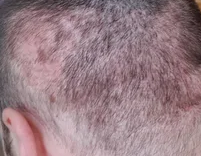I just had a patient who, in our routine testing, had a lab test that was HIV positive (he was very surprised). He is over 50, recently married and his wife of three years was tested for HIV prior to her marriage, but he was not. He and she came into the office quite calm. They had just returned from getting the news from their family doctor who wanted to repeat the test considering the patient’s history would not support a high risk status. When he came in, we spoke calmly about it and we ran tests from our lab on both the patient and his wife. Within 2 days, the tests from my office came back negative, as did his family doctor’s repeat test. What a hell he must have gone through!
I have dealt with many men who were HIV positive and who wanted a hair transplant. They knew that they were positive to the test, were already under treatments, and had good control of the disease. I took them on as patients just as I would anybody else. I routinely screen for HIV, although I am not hard on this rule. I have had 5 patients with positive tests when these men did not suspect that they were positive to the virus. The shock of my interviews with these patients is memorable and I spent a great deal of time working with them, arranging a repeat test, being sure that the tests are not false positives and advising them as any good, concerned human being would do. This was the first time (1 out of 6) that the test came back negative on re-running the tests. Four of the six patients eventually had hair transplants with me including the patient who tested a false positive this week.
I remember one patient who had advanced HIV, not controlled by medications very well. He was healthy enough to have a hair transplant and did after I worked through this decision with his doctor. I remember him well for two reasons: (1) He felt that he was going to die and wanted to meet his maker looking good with a full head of hair, (2) I accidentally cut my hand with the scalpel that I used on him. Yes, accidents can happen, and this was certainly one that I’ll never forget. Over the next six months, I tested myself for HIV monthly and have done so yearly, every time being negative (that was 10 years ago). I learned that the risk to a person who cuts his hand with a surgical knife that was previously exposed to HIV blood is less than 1% in contracting the disease, but had it been a needle with a drop of blood in it, the story would have been different. In fact, most healthcare workers who got HIV from a hospital accident got it through a needle that originally contained blood. About a year after the incident, this patient’s mother came by my office to inform me that her son had passed away. She smiled as she told me, ” He was happy in the last days of his life, and when he looked in the mirror, he liked the new look he got from the transplant.” She went on to tell me that her son wanted to lie in an open casket at his funeral and he wanted to have his own natural hair at that time. He wanted his friends to remember him that way. I realize that this story may seem a little morbid to some readers, but I wanted to share this very humbling experience where I helped someone achieve one of their final goals in life, even it the goals were outside the goals I normally see.


 The area that balds in the Norwood Class 4A is the frontal area (see art at right). Finasteride might slow the loss down in the front, but rarely reverses the hair loss in that pattern. Minoxidil might regrow hair in that area, but it would be extremely rare.
The area that balds in the Norwood Class 4A is the frontal area (see art at right). Finasteride might slow the loss down in the front, but rarely reverses the hair loss in that pattern. Minoxidil might regrow hair in that area, but it would be extremely rare. Short of laser treatment to kill the hair area by area, you may be stuck with what nature and your ancestors gave you.
Short of laser treatment to kill the hair area by area, you may be stuck with what nature and your ancestors gave you.